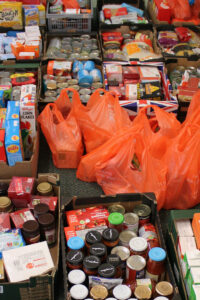
By Dr Naomi Maynard, Good Food Programme Director, Feeding Liverpool
We can all see it at the check-out, food prices are continuing to rise. So perhaps the data released today showing that annual food inflation is now at 11.6% – the fastest rise on record – is no surprise, but for our network of emergency food providers and community food spaces, and the people they serve, it crystallizes what has already become a painful and worrying reality.
Foodbank use across the city continues to rise each month as households who previously were ‘just about managing’ now cannot cope with the triple blow of rises to energy, petrol and food prices – there is simply nothing left to cut in what were already tight budgets. Community food spaces – our city’s pantries, food markets and community shops – are reporting similar trends, as more people look for ways to save money. There has been a notable step-change from residents describing a food pantry as a place you ‘topped up’ your households food shop, to a now relying on the food they get as the basis of their households food that week.
For some foodbanks, the drop in donations has led them to rely on funding to bulk buying basic items to fill their food parcels, with rising food prices this funding converts into less and less food each week. Micah Liverpool, who now give out about 400 food parcels each week, explained that a few months ago they were bulk buying pasta from a supermarket at 20p for 500g. The supermarket is now no longer stocking this item at that price, meaning they now need to choose a higher priced range of items where 500g of pasta costs over £1.
The thousands of pregnant women and lower-income families with young children in Liverpool who receive support via the Healthy Start Scheme, are also on the sharp end of these rises. The Healthy Start Scheme is a government benefit that has remained static since April 2021 – with the majority of recipients receiving £4.25 per week (this doubles to £8.50 during the first year of a child’s life). As prices of fruit, vegetables and milk continue to rise, this weekly allowance doesn’t stretch as far, having cumulative long term negative impacts on the health of children and pregnant women in Liverpool.
As I said to Capital news today, I am no economist, nor are many who work and volunteer at the organisations we seek to serve and support. But what we can say and what we said last month collectively with Feeding Britain, the Independent Food Aid Network and the Trussell Trust is that we are at breaking point. Something needs to change now, before this situation gets worse. Benefits and support payments– including the Healthy Start Scheme and the weekly allowance for Asylum Seekers – needs to be uprated to reflect inflation. The annual inflation statistics are not theoretical numbers, they tell us whether our nan will need to skip a meal today or whether we can give our children a piece of fruit when they come home from school. Change needs to happen now, not in three, six or nine months time.
